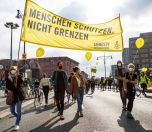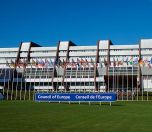Click to read the article in Turkish
"The judiciary disregarded fair trial guarantees and due process and continued to apply broadly defined anti-terrorism laws to punish acts protected under international human rights law.
"Some members of the judiciary and legal profession were subjected to sanctions for the legitimate exercise of their professional duties.
"The judicial harassment of individuals such as journalists, politicians, activists, social media users and human rights defenders for their real or perceived dissent continued."
The above findings about Turkey are from the Amnesty International's 2020/2021 report "The State of the World's Human Rights."
Starting its analysis of human rights in Turkey with these findings, the report has elaborated on "state overreach", "repression of dissent", "freedom of expression", "human rights defenders", "rights of LGBTI+s, women and girls", "freedom of assembly", "torture, other ill treatment and enforced disappearance" and "rights of asylum seekers, refugees, migrants."
Büyükada trial and Osman Kavala
Amnesty International report has specifically referred to some court cases, including the Büyükada trial and case of Osman Kavala:
"Four human rights defenders, including Taner Kılıç, were convicted in the baseless Büyükada trial. Despite his acquittal in the Gezi trial and a European Court of Human Rights (ECtHR) ruling for his release, Osman Kavala remained in prison.
Pressure on municipalities
Noting that "in April, the government used COVID-19 crisis to further crack down on the opposition," the report has said that it banned "several opposition-run municipal donation campaigns and launching investigations into pandemic fundraising efforts by the mayors of Istanbul and Ankara."
Pressure on judiciary and lawyers
Under the title "State Overreach", the report has first shared information about the state of the judiciary in Turkey:
"A disciplinary investigation initiated by the Council of Judges and Prosecutors against the three judges who on 18 February acquitted the Gezi trial defendants, including civil society leader Osman Kavala, was ongoing at the end of the year. The investigation followed the President's public criticism of the acquittal decision.
"In July, Parliament passed a law changing the structure of bar associations. Thousands of lawyers protested and 78 out of 80 bar associations signed a statement opposing the reform. The new law weakens the associations' authority and independence.
"Criminal investigations targeting lawyers for representing clients accused of "terrorismrelated offences" continued. In September, police detained 47 lawyers on suspicion of "membership of a terrorist organization", based solely on their work. At least 15 lawyers were remanded in pre-trial detention.
"Also in September, the Court of Cassation upheld the prison sentences of 14 lawyers from the Progressive Lawyers Association, prosecuted under terrorismrelated legislation."
TTB targeted by President
The report has also specifically referred to the Turkish Medical Association (TTB) being targeted by AKP Chair and President Recep Tayyip Erdoğan: "In October, the President targeted the Turkish Medical Association (TTB) and called its new chair "a terrorist" after the TTB repeatedly criticized the government's response to COVID-19."
Pressure on the opposition
Under "Repression of Dissent", the report has said:
"Abusive investigations and prosecutions targeting former parliamentarians and members of opposition parties continued.
"In June, an Istanbul Appeals Court upheld the conviction of Canan Kaftancıoğlu, Istanbul Provincial Chairperson of the opposition Republican People's Party (CHP). She was sentenced to nine years and eight months in prison for "insulting the President" and "insulting a public official", "inciting enmity and hatred" and "making propaganda for a terrorist organization". The sentence referred to tweets she had shared seven years earlier. The case was pending before the Court of Cassation at year's end.
"In October, 20 former and current members of the pro-Kurdish Peoples' Democracy Party (HDP), including the Mayor of Kars city, Ayhan Bilgen, were remanded in pre-trial detention for their alleged role in violent protests in October 2014. The accusations were largely based on social media posts from the official HDP twitter account at the time.
"Following the remand in pre-trial detention of Ayhan Bilgen, the Ministry of Interior on 2 October appointed the Kars Governor as trustee to Kars Municipality.
"Former co-chairs Selahattin Demirtaş and Figen Yüksekdağ remained in pre-trial detention as part of the same investigation since September 2019. A new indictment was pending at the first instance court at the end of the year, days after the ECtHR's Grand Chamber called for the immediate release of Selahattin Demirtaş, finding that his rights to freedom of expression, liberty and security, free elections and not to be subjected to the misuse of limitations on rights had been violated."
Pressure on civil society
Amnesty International has also specifically referred to the new law passed in Turkey in the context of its effects on civil society:
"In December, Parliament passed a new law ostensibly to prevent the financing of the proliferation of weapons of mass destruction, with severe consequences for civil society organizations.
"The law included allowing the removal of individuals facing prosecution under anti-terrorism laws from boards of NGOs to be replaced with government-appointed trustees."
Journalists
About press freedom in Turkey, the report has said:
"Journalists and other media workers remained in pre-trial detention or served custodial sentences. Some prosecuted under anti-terrorism laws were convicted and sentenced to years of imprisonment, their legitimate work presented as evidence of criminal offences.
"In March, police detained at least 12 journalists for their reporting of the COVID-19 pandemic."
Human rights defenders
"Dozens of human rights defenders faced criminal investigations and prosecutions for their human rights work," Amnesty International has reminded the international community, briefly adding:
"In July, the Büyükada trial of 11 human rights defenders concluded with the court convicting Taner Kılıç of "membership of the Fethullah Gülen Terrorist Organization (FETÖ)", sentencing him to six years and three months' imprisonment; İdil Eser, Günal Kurşun and Özlem Dalkıran were sentenced to "one year and 13 months" for "knowingly and willingly supporting FETÖ".
"The remaining seven defendants were acquitted. On 1 December, a regional appeals court upheld the convictions of the four defenders, who appealed to the Court of Cassation.
"In January, the Istanbul prosecutor requested the conviction of human rights lawyer Eren Keskin in the main Özgür Gündem trial, along with others who had participated in a solidarity campaign. In February, in an interim ruling, her codefendants Necmiye Alpay and Aslı Erdoğan were acquitted. The prosecution against Eren Keskin and three other defendants continued.
"In March, Raci Bilici, former chair of the Diyarbakır branch of the NGO Human Rights Association (IHD), was sentenced to six years and three months' imprisonment for "membership of a terrorist organization", based on his human rights work. An appeal was pending at the end of the year.
"In October, following a 2019 report by the research group Forensic Architecture, the trial of three police officers and an alleged member of the armed Kurdistan Workers Party (PKK) accused of killing human rights lawyer Tahir Elçi began almost five years after his death in Diyarbakır. The officers faced charges of "causing death by culpable negligence"."
Women and LGBTI+ rights
Sharing details about the state of women's and LGBTI+ rights in Turkey, Amnesty International has said:
"In April, a senior state official at the Religious Affairs Directorate (Diyanet) blamed homosexuality and people in extra-marital relationships for the spread of HIV/AIDS. He urged followers to combat this "evil" in a Friday sermon focusing on the COVID-19 pandemic, a call supported by the President.
"Bar associations criticizing the statements faced criminal investigation under Article 216/3 of the Penal Code that criminalizes "insulting religious values".
"In July, the brutal murder of 27-year-old student Pınar Gültekin led to country-wide protests. The trial of two men accused of her murder continued at the end of the year.
"In August, suggestions by some politicians in the ruling Justice and Development Party (AKP) to withdraw from the Istanbul Convention sparked country-wide demonstrations. Women's rights organizations criticized the lack of implementation of the Convention, including an adequate response to rising domestic violence during COVID-19 restrictions.
"The Ministry of Interior announced that 266 women had died as a result of gender-based violence in 2020, though the figures provided by women's organizations were much higher."
Torture, enforced disappearance
Touching upon the incidents of torture, ill treatment and enforced disappearance as well, the report has briefly said:
"In September, Osman Şiban and Servet Turgut suffered severe injuries after being detained and allegedly beaten by a large group of soldiers in Van province, according to Osman Şiban's testimony. Servet Turgut died in hospital on 30 September.
"A criminal investigation into the allegations of torture opened by the Van Prosecutor was subjected to a secrecy order.
"In October, four journalists who covered the case were arrested in Van for being "members of a terrorist organization" on the grounds of the news agencies they worked for and of making news on "public incidents in line with PKK/KCK's [Kurdistan Communities Union] perspective and orders to the detriment of the state".
"In December, a prisoner on pre-trial detention at Diyarbakır prison, Mehmet Sıddık Meşe, was denied access to urgent medical care and to examination by medical forensic staff after he was allegedly subjected to severe beating by prison guards. The prosecuting authorities had not launched an independent investigation into the allegations by year's end.
"In February, Gökhan Türkmen, one of seven men accused of links with the Fethullah Gülen movement who went missing in 2019, recounted in court the torture and other illtreatment he had been subjected to during the 271 days of his enforced disappearance. The court requested a criminal investigation to be launched into his allegations.
"The whereabouts of Yusuf Bilge Tunç, disappeared in August 2019, remained unknown at the end of the year."
Refugees
Lastly, the report has shared the following information and findings about the conditions of refugees in Turkey:
"Turkey continued to host the largest refugee population in the world: around 4 million people, including 3.6 million Syrians. The 2016 EU-Turkey deal, which provides European financial assistance to support refugees in Turkey in exchange for its cooperation on migration control and returns, continued to operate.
"After announcing the opening of the EU borders on 27 February, Turkey recklessly encouraged and facilitated the movement of asylum-seekers and migrants to the Greek land border, where violent pushbacks led to deaths and injuries (see Greece entry). At the end of March, Turkish authorities removed people from the border area.
"According to an NGO report published in October, Turkey deported more than 16,000 Syrians to Syria during the year. A group of Syrians reported in May they were forcibly returned to Syria and had been pressured into signing documents stating that they wanted to return.
"As of September, according to UN numbers, Turkey deported around 6,000 people to Afghanistan, although the situation in the country still did not allow safe and dignified returns." (EKN/SD)






